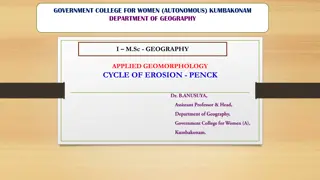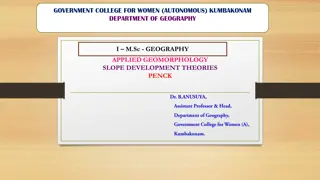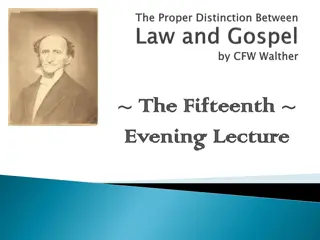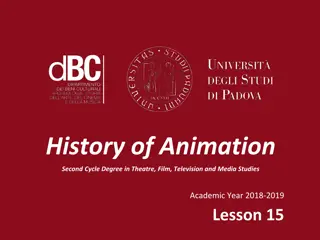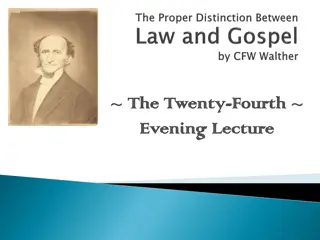Understanding Penck's Cycle of Erosion in Geomorphology
Walther Penck introduced an alternative model to Davisian cycle, emphasizing the interplay between upliftment and erosion rates in landscape formation. Penck's concept focuses on relative intensity of degradation processes, phase of upliftment, and rates of erosion, rejecting the idea of stages in l
2 views • 32 slides
Understanding Slope Development Theories by Walther Penck in Geomorphology
Explore the Slope Development Theories by Walther Penck in Geomorphology, focusing on concepts like Pendiplanation, Pedimentation, and the relation between endogenic and exogenic forces in shaping landscapes. Learn about the evolution of landforms and the criticism of the Davisian theory of Erosion
1 views • 28 slides
Evolution of Hill Slopes: Penck's Slope Replacement Theory
Penck's slope replacement theory proposes that the angle of a hill slope decreases as gentler slopes replace steeper ones, leading to the concavity of the slope profile. The model explains how vertical erosion by streams and denudation shape hillslopes, causing them to retreat in a parallel manner.
0 views • 9 slides
The Importance of Applying the Gospel and Assurance of Grace in the Christian Life
Walther uses examples from the New Testament to emphasize the immediate application of the Gospel to alarmed sinners. He asserts that the Lutheran Church is the Bible Church and warns against relying on feelings for assurance of grace. Doubt in salvation undermines the Christian life and diminishes
0 views • 27 slides
Evolution of Animation in Europe: Pioneers and Innovations
Animation in Europe faced challenges in attaining industrial force, yet notable figures like Hans Richter, Walther Ruttmann, and Viking Eggeling made significant contributions through artistic experiments and abstract films. Richter, a Cubist painter, co-founded Dadaism and produced iconic works suc
0 views • 33 slides
Insights on Faith and Contrition from Walther's Teachings
Walther emphasizes the importance of contrition while highlighting that it is not the cause of something specific. He distinguishes between the desire to come to Jesus and the desire to experience contrition. The context also discusses historical aspects like Rationalism in the Protestant Church of
0 views • 20 slides
